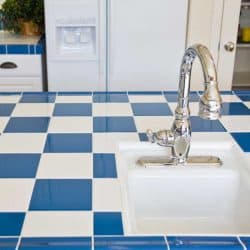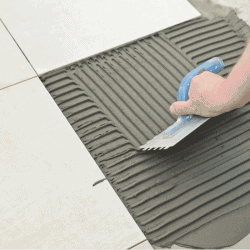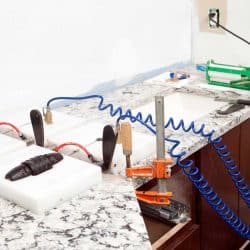The kitchen is one of the most frequented rooms in any given home. And for that reason, it's important that your floor is well taken care of and prepared to stand the test of time. If you have tile in your kitchen, then it's certainly going to have grout around each piece. But should that grout be sealed? We've done the work to bring you the answer.
Kitchen floor grout should be sealed. Grout needs to cure before it can be sealed. The main reason for sealing grout is that it is porous and because of this, it can easily become stained. In order to avoid this and prevent mold and mildew from growing on it, grout should always be sealed.
Keep reading to learn more about how to tell if your grout is sealed, how often grout should be sealed, how to choose the right type of sealer for your situation, how many coats of grout sealer are needed, and more.

Kitchen Floor Grout
There are a few advantages and disadvantages of sealing vs. not sealing grout. A good reason for sealing grout is to prevent stains from forming. Grout sealer makes it resistant to water. Sealing grout prevents it from absorbing moisture which is important since you do not want to be breathing in mold spores.
A downside of not sealing grout is that it will retain moisture and allow bacteria to grow. Grout will also become damaged more quickly if you do not seal it.
How do you know if grout is sealed?
A good way to tell if your tile or grout has been sealed is by dripping a little bit of water onto it to see if the water beads up. If the grout darkens or changes color, it is most likely not sealed. If the grout looks the same after water is added to it, it is more than likely sealed.
You can do this by using a spray bottle in the mist setting. Spray the grout with a mist of water and let it sit for two or three minutes. If the water is absorbed, the grout is not sealed. When the water is repelled, you can conclude the grout is sealed.
How often should grout be sealed?

Grout should be sealed about every two years. If the area where grout is located in your home is a high-traffic area, it may need to be sealed more often. One way to tell if your grout needs to be sealed is if it is cracked or damaged. The grout sealer weakens over time so when it begins to peel, you know it needs to be sealed again.
Grout wears down more quickly when it is outdoors too. Bathrooms that are closed off and do not have a way to vent are more humid and contain more moisture. This moisture breaks down the grout more quickly than it would otherwise. Use a water-vinegar mixture or a light bleach to clean your grout before re-sealing it.
Click here to see this grout sealer on Amazon.
What type of grout sealer should I use?
There are two different types of grout sealer. The two are either membrane-forming or penetrating. Membrane-forming grout sealers tend to peel or become cloudy. This is because moisture pushes out to the surface. This type of sealer helps prevent the permeation of water by creating a coating on the surface of the grout. It is okay to use in kitchens, but not great for bathrooms.
Membrane-forming grout sealers can be found in a variety of pigments. This allows you to change the color of your grout. They work for unglazed tile but will not stick to tile that is glazed.
Penetrating sealers breathe after soaking into grout which is the better option for places that will be moist. This type of sealer works as the latex and silicone it is made of fills in the gaps as the grout absorbs it. This keeps the moisture out.
Which sealer you choose depends on the material you are working with as well as where it will be used. When you look at all of the options of grout sealers, you will see they are labeled based on material for example marble, stone, or ceramic. The amount of moisture in the area where your grout will be located also impacts which kind of sealant you should choose.
Click here to see this product on Amazon.
Sealer Applicators
There are a few options when it comes to choosing the right applicator tool for your project. Aerosol spray sealers are convenient but do not work well when you have thin grout lines. For thin grout lines, a sponge will make it so that you can seal larger sections of tiles and grout. A sponge allows you to wipe over both of the surfaces at the same time.
When you are sealing glazed tiles that the sealer will not adhere to, use an applicator brush. There are also applicator bottles available with a rolling wheel on the top which makes this job that much easier and more efficient. It is a good idea to keep a dry cloth handy during this process to wipe off any excess sealer.
If you are working with tile that is glazed, you will want to wipe off the sealer from the tile within about seven minutes of applying it so that you do not end up with a foggy film on top of your nice looking tile.
Grout pens are an alternative to the other two applicators we mentioned. These are great for small spaces. There are a variety of colors available so that you can make your grout whichever color you would like. Using a grout pen allows you to cover up stained grout as well.
Click here to see this product on Amazon.
How many coats of grout sealer are needed?
In order to have sufficient protection of your grout, you should use two or three coats of sealer. It takes about an hour after the first application before it is dry enough to add a second coat. Allow the coats to dry thoroughly before adding another layer of protection to make the most of the sealer.
What happens if you don't use grout sealer?
If you do not use grout sealer, your grout is likely to become stained and will wear out faster than it would if it was sealed. Your grout will have mold or mildew growing on it if you choose not to use a grout sealer. Using a grout sealer is best because it makes the grout last longer and keeps it protected from germs.
Is there grout that doesn't need to be sealed?
Epoxy grout does not need to be sealed. This is because it is said to be pre-sealed. The majority of types of grout are cement-based. Epoxy grout is more flexible than cement-based grout which makes it less likely to become cracked or chipped. Although epoxy grout is pre-sealed, unsealed tiles should still be sealed before the epoxy grout is applied. It is more expensive but is water-resistant on its own and seals itself as it dries. It may be worth paying a little more money to get the job done right.
In Closing

Overall, it is best to seal the grout in your kitchen. This is because grout stains easily and is absorbent. When grout absorbs moisture, it has the potential for bacteria to grow on it. You do not want mold or mildew growing where you cook or eat!
Before you go, check out the following links that may be of interest to you:
Do You Tile Under Kitchen Cabinets?
How To Protect Kitchen Cabinet Doors From Water Damage
Do Granite Countertops Need To Be Sealed [And How To Do That]







![Four metal bar stools matching the breakfast bar with white kitchen cabinets and cupboards, What Color Paint Goes With Beige Tile In The Kitchen? [14 Great Ideas!]](https://kitchenseer.com/wp-content/uploads/2022/04/Four-metal-bar-stools-matching-the-breakfast-bar-with-white-kitchen-cabinets-and-cupboards-250x250.jpg)

